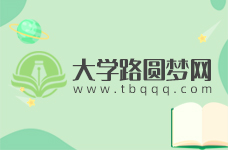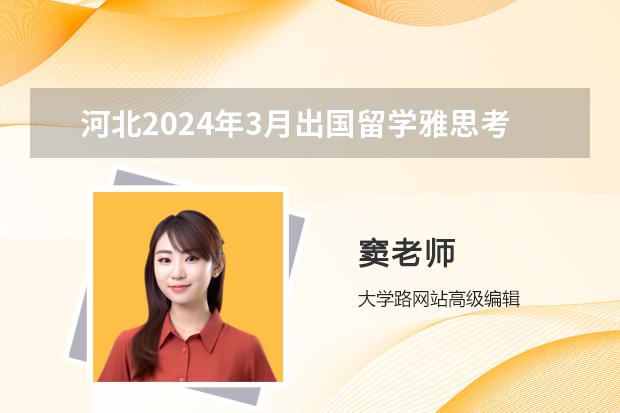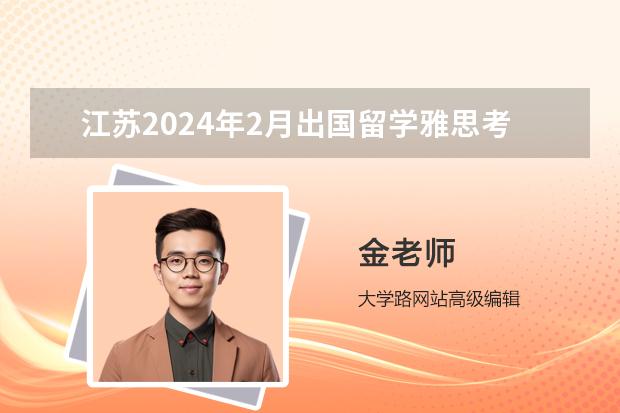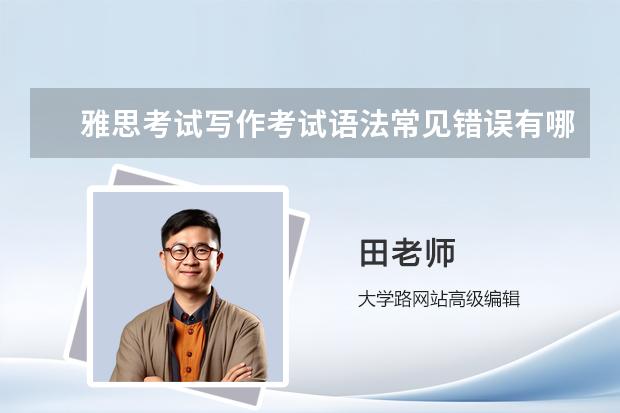最近经常有小伙伴私信询问雅思阅读如何上8分?相关的问题,今天,大学路小编整理了以下内容,希望可以对大家有所帮助。
本文目录一览:
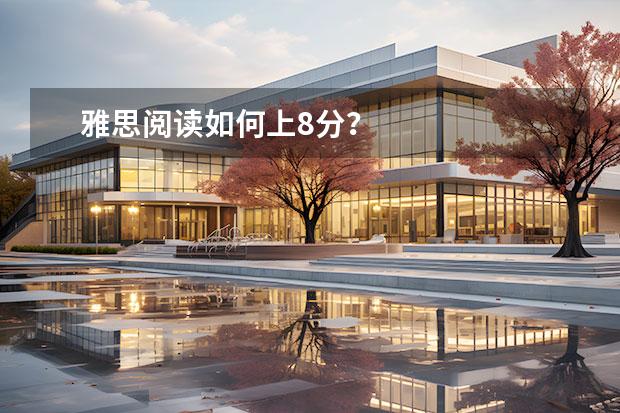
2023年10月19日雅思阅读考试真题及答案
您好,我是专注留学考试规划和留学咨询的小钟老师。在追寻留学梦想的路上,选择合适的学校和专业,准备相关考试,都可能让人感到迷茫和困扰。作为一名有经验的留学顾问,我在此为您提供全方位的专业咨询和指导。欢迎随时提问!
上周末完成的雅思考试,相信大家都对真题和答案很感兴趣,那么今天就来和小钟老师一起来看看2023年10月19日雅思阅读考试真题及答案。
Section1
青春期能力发展(重复19年4月13日第一篇文章,考试文章和部分题目稍有改动,真题仅供参考)
Section2
蜜蜂对于生态的重要性
Section3
可以参考:历史教学新方法 New Ways of Teaching History
New Ways of Teaching History
In a technology and media-driven world, it's becoming increasinglydifficult to get our students’attentions andkeep them absorbed in classroom discussions. This generation, in particular,has brought a unique set of challenges to the educational table. Whereas youthare easily enraptured by high-definition television, computers, iPods, videogames and cell phones, they are less than enthralled by what to them areobsolete textbooks and boring classroom lectures. The question of how to teachhistory in a digital age is often contentious. On the one side, the old guardthinks the professional standards history is in mortal danger fromflash-in-the-pan challenges by the distal that are all show and no the other Side, the self-styled“disruptors”offer over-blown rhetoric about how digital technology has changedeverything while the moribund profession obstructs all progress in the name ofoutdated ideals. At least, that's a parody (maybe not much of one) of how thedebate proceeds. Both supporters and opponents of the digital share moredisciplinary common ground than either admits.
When provided with merely a textbook as a supplemental learning tool, testresults have revealed that most students fail to pinpoint the significance ofhistorical events and individuals. Fewer still are able to cite andsubstantiate primary historical sources. What does this say about the way oureducators are presenting information? The quotation comes from a report of a1917 test of 668 Texas students. Less than 10 percent of school-age childrenattended high school in 1917; today, enrollments are nearly universal. Thewhole world has turned on its head during the last century but one thing hasstayed the same: Young people remain woefully ignorant about history reflectedfrom their history tests. Guess what? Historians are ignorant too, especiallywhen we equate historical knowledge with the "Jeopardy" Daily a test, those specializing in American history did just fine. But those withspecialties in medieval, European and African history failed miserably whenconfronted by items about Fort Ticonderoga, the Olive Branch Petition, or theQuebec Act—all taken from a typical textbook. According to thetesters, the results from the recent National Asses*ent in History, likescores from earlier tests, show that young people are "aby*allyignorant" of their own history. Invoking the tragedy of last September,historian Diane Ravitch hitched her worries about our future to the idea thatour nation's strength is endangered by youth who do poorly on such tests. Butif she were correct, we could have gone down the tubes in 1917!
There is a huge difference between saying "Kids don’t know the history we want then to know" and saying "Kids don'tknow history at all." Historical knowledge burrows itself into ourcultural pores even if young people can't marshal it when faced by a multiplechoice test. If we weren’t such hypocrites(or maybe if we were better historians) we'd have to admit that today'sstudents follow in our own footsteps. For too long we've fantasized that byrewriting textbooks we could change how history is learned. The problem,however, is not the content of textbooks but the very idea of them. No humanmind could retain the information crammed into these books in 1917, and it cando no better now. If we have learned anything from history that can be appliedto every time period, it is that the only constant is change. The teaching ofhistory, or any subject for that matter, is no exception. The question is nolonger whether to bring new technologies into everyday education; now, thequestion is which There is a huge difference between saying "Kids don’t know the history we want then to know" and saying "Kids don'tknow history at all." Historical knowledge burrows itself into ourcultural pores even if young people can't marshal it when faced by a multiplechoice test. If we weren’t such hypocrites(or maybe if we were better historians) we'd have to admit that today'sstudents follow in our own footsteps. For too long we've fantasized that byrewriting textbooks we could change how history is learned. The problem,however, is not the content of textbooks but the very idea of them. No humanmind could retain the information crammed into these books in 1917, and it cando no better now. If we have learned anything from history that can be appliedto every time period, it is that the only constant is change. The teaching ofhistory, or any subject for that matter, is no exception. The question is nolonger whether to bring new technologies into everyday education; now, thequestion is which technologies are most suitable for the range of topicscovered in junior high and high school history classrooms. Fortunately,technology has provided us with opportunities to present our Civil War lessonplans or our American Revolution lesson plans in a variety of new ways.
Teachers can easily target and engage the learners of this generation byeffectively combining the study of history with innovative multimedia- PowerPointand presentations in particular can expand the scope of traditional classroomdiscussion by helping teachers to explain abstract concepts while accommodatingstudents* unique learning styles. PowerPoint study units that have beenpre-made for history classrooms include all manner of photos, prints, maps,audio clips, video clips and primary sources which help to make learninginteractive and stimulating. Presenting lessons in these enticing formats helpstechnology-driven students retain the historical information they'll need toknow for standard exams.
Whether you are covering Revolutionary War lesson plans or World War IIlesson plans, PowerPoint study units are available in formats to suit the needsof your classroom. Multimedia teaching instruments like PowerPoint software aregetting positive results the world over, framing conventional lectures withcaptivating written, auditory and visual content that helps students recallnames, dates and causal relationships within a historical context.
History continues to show us that new times bring new realities. Educationis no exception to the rule. The question is not whether to bring technologyinto the educational environment. Rather, the question is which technologiesare suitable for U.S. and world history subjects, from Civil War lesson plansto World War II lesson plans. Whether you’re covering your American Revolution lesson plans or your Cold War lessonplans, PowerPoint presentations are available in pre-packaged formats to suityour classroom's needs.
Meanwhile, some academic historians hold a different view on the use oftechnology in teaching history. One reason they hold is that not all facts canbe recorded by film or videos and literature is relatively feasible in thiscase her challenge they have to be faced with is the painful process tolearn new technology like the making of PowerPoint and the editing of audio andvideo clips which is also reasonable especially to some elderly historians.
Question
Reading this passage has eight paragraphs, A- G
Choosing the correct heading for paragraphs A- G from the list of headingbelow
Write the appropriate number, i- x, in boxes 28-34 on your answer sheet
List of Headings
i unavoidable changing facts to be considered when picking up technologymeans
ii A debatable place where the new technologies stand in for historyteaching
iii Hard to attract students in traditional ways of teaching history
iv Display of the use of emerging multimedia as leaching tools
v Both students and professionals as candidates did not produce decentresults
vi A good concrete example illustrated to show how multimedia animates thehistory class
vii The comparisons of the new technologies applied in history class
viii Enormous breakthroughs in new technologies
ix Resistance of using new technologies from certain historian
x Decisions needed on which technique to be used for history teachinginstead of improvement in the textbooks
28 Paragraph A
29 Paragraph B
30 Paragraph C
31 Paragraph D
32 Paragraph E
33 Paragraph F
34 Paragraph G
Question 35-37
Do the following statements agree with the information given in ReadingPassage?
In boxes 35-37 on your answer sheet, write
YES if the statement is true
NO if the statement is false
NOT GIVEN if the information is not given in the passage
35 Modem people are belter at memorizing historical information comparedwith their ancestors.
36 New technologies applied in history- teaching are more vivid forstudents to memorize the details of historical events.
37 Conventional ways like literature arc gradually out of fashion as timegoes by.
Question 38-40
Complete the following summary of the paragraphs of Reading Passage, usingmore than three words from the Reading Passage for each answer.
Write your answers in boxes 38-40 on your answer sheet.
Contemporary students can be aimed at without many difficulties byintegrating studying history with novel. ..38.... Conventional classroomdiscussion is specially extended by two ways to assist the teachers tointerpret ...39... and at the same time retain students' distinct learningmodes. PowerPoint study units prepared beforehand comprising a wide variety ofelements make ...40.... learning feasible. Combined classes like this can alsobe helpful in taking required tests.
希望以上的答复能对您的留学申请有所帮助。如果您有任何更详细的问题或需要进一步的协助,我强烈推荐您访问我们的留学官方网站
,在那里您可以找到更多专业的留学考试规划和留学资料以及*的咨询服务。祝您留学申请顺利!
雅思阅读如何上8分?
对于雅思考试来说,阅读部分是比较容易拿高分甚至是满分的一项,那么雅思阅读如何上8分?
1.词汇是基础
这点相信很多人都知道它的重要性,试想一篇文章单词都不认识,那些所谓的方法技巧这时候也是没有任何作用的;还有岳父部分要运用关键词定位,可是关键词你都不认识,那还怎么定位呢?所以单词是基础。在记单词的时候,我们要去分类记忆高频词汇,并且适当扩展一些常用动词、连词是很有必要的。
2.语法也不能落下
思润小编这里就不建议特地去看语法书了,而是在我们完阅读的时候要去精读文章,遇到文章当中的长难句去试着翻译,并分析句子结构。我觉得翻译是个不错的方法,自己翻译完再对比去看译文,可以看下自己的理解有没有出现偏差。每次做完阅读真题后,把不懂的句子画出来做语法分析,尤其是单词都熟悉就是不能理解整体意思的句子以及题目直接考到的长难句,久而久之,你的语法也就没有问题了。
3.阅读速度要跟上
雅思阅读篇幅很长,在短短的45分钟时间,去精读弄懂每个句子基本是不允许的,所以阅读速度对于每个人考生都至关重要。那么问题也就来了,如何提高阅读速度呢?这时候需要大家在刷题的时候培养出SCANNING(跳读,寻读)、SKIMMING(浏览,略读)和SCANNING(跳读,寻读)的能力,有一些特殊词一定要做标记,比如说:数字,时间,地点,专有名词,大写字母,人名,斜体字等。
4.方法技巧的总结
在平时备考过程中,一定多练,总结出自己的阅读技巧,毕竟别人的不一定适合你。除此之外,对阅读题型也要非常了解,当然这点你在刷题的过程中都会了解到。
如何提高雅思阅读分数?除了以上几点,思润小编提醒大家的是,雅思机经一定要利用好,尤其在提分阶段。建议把同一套题多做几遍,可以隔一小段时间,再回来把做过的题目再做一遍,时间来不及可只做错题部分,具体方法可参考如下:
1)限定时间做雅思阅读题,简单测试一下自己的英语水平
2)做完试题及时核对答案,标注出该选项在文章中的依据
3)找出题目和文中能进行同义替换的词语,分类整理后用于背诵
4)将正确答案放到具体的句子中,进行理解和记忆
剑桥雅思10 test3 阅读 答案
答案解析:
1. 选ii。定位到第二段第一句话:Touri* in the mass form as we know it today is a distinctly twentieth-century phenomenon. 表明就我们所知,广义的旅游业是一个二十世纪的现象。选项中的mass touri*与原文中的touri* in the mass form是同义替换。
2. 选i。定位到第三段第一句话:Touri* today has grown significantly in both economic and social importance. 即目前旅游业对经济及社会都非常重要。选项中的significance替换原文的importance。
3. 选v。定位到第四段第一句话:However, the major problems of the travel and touri* industry that have hidden or obscured its economic impact are the diversity and fragmentation of the industry itself. 意思是旅游业的主要问题是这个产业本身的多样性和分散性,这使得其经济影响变得不那么明显。选项中的difficulty,effects分别替换原文的problems和impact。
4. 选vii。定位到第五段第一句话:Once the exclusive province of the wealthy, travel and touri* have become an institutionalised way of life for most of the population. 表明旅游业曾经是富人们的特权,而现在已经变成大多数人们习以为常的一种生活方式了。选项中的world,impact替换原文的most of the population, institutionalised。
Questions 5-10 判断题
5. The largest employment figures in the world are found in the travel and touri* industry.
6. Touri* contributes over six per cent of the Australian gross national product.
7. Touri* has a social impact because it promotes recreation.
8. Two main features of the travel and touri* industry make its economic significance difficult to ascertain.
9. Visitor spending is always greater than the spending of residents in tourist areas.
10. It is easy to show statistically how touri* affects individual economies.
答案解析:
5. 选TRUE。定位到第三段第三句话: According to the World Travel and Touri* Council (1992), ‘Travel and touri* is the largest industry in the world on virtually any economic measure including value-added capital investment, employment and tax contributions’。意思是旅游业是全世界最大的行业,不管是用哪种经济学估算,其中包括资本增值投资,就业及税收贡献。题目中的figures替换原文measure。
6. 原文没有提到Australian gross national product这个概念,所以选择NG。
7. 原文没有提到recreation这个概念,所以选择NG。
8. 选TRUE。定位到第四段第一句话:However, the major problems of the travel and touri* industry that have hidden, or obscured its economic impact, are the diversity and fragmentation of the industry itself. 意思是旅游业的主要问题是这个产业本身的多样性和分散性,这使得其经济影响变得不那么明显。题目中的two main features指代原文的diversity and fragmentation。
9. 原文没有提到visitor spending 和residents’ spending的比较关系,所以选择NG。
10. 选FALSE。定位到第四段倒数第二句,原文表明this problem has made it difficult ...to estimate the contribution it makes, 即估算旅游业对经济的贡献很困难,所以选FALSE。
Questions 11-13 句子填空题
11. In Greece, touri* is the most important ________.
12. The travel and touri* industry in Jamaica is the major ______ .
13. The problems associated with measuring international touri* are often reflected in the measurement of _______ .
答案解析:
11. 填source of income/home。定位到最后一段的第三句: For example, touri* is the major source of income in Bermuda, Greece, Italy, Spain, Switzerland, and most Caribbean countries. 说明旅游业在以下国家都是收入的主要来源,题目中的most important替换原文的major。
12. 填employer。定位到最后一段的第四句: In addition, Hawkins and Ritchie, quoting from data published by the American Express Company, suggesting that the travel and touri* industry is the number one ranked employer in the Bahamas, Brazil, Canada, France, (the former) West Germany, Hong Kong, Italy, Jamaica, Japan, Singapore. 说明旅游业在一下国家是最需要聘用雇员的行业,题目中的major替换原文的number one ranked。
13. 填domestic industry。定位到最后一段的最后一句: In many cases, similar difficulties arise when attempts are made to measure domestic touri*. 说明测量估算国内旅游业非常困难,题目中的measurement, problems替换原文的measure, difficulties。
以上就是大学路小编整理的内容,想要了解更多相关资讯内容敬请关注大学路。

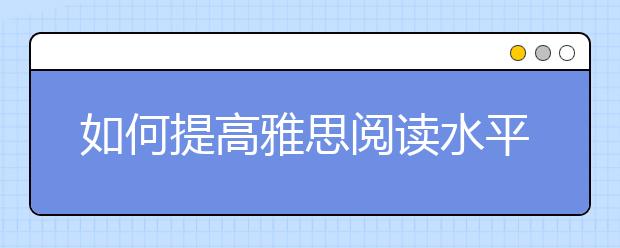 如何提高雅思阅读水平,抓住单词与句子难点
如何提高雅思阅读水平,抓住单词与句子难点
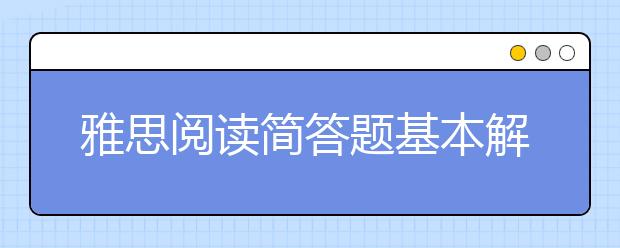 雅思阅读简答题基本解题思路
雅思阅读简答题基本解题思路
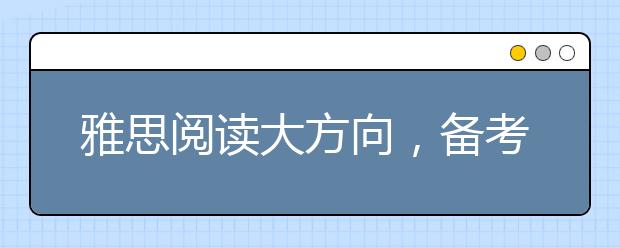 雅思阅读大方向,备考确定好航标
雅思阅读大方向,备考确定好航标
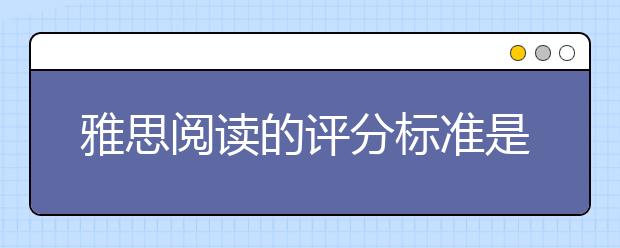 雅思阅读的评分标准是多少?
雅思阅读的评分标准是多少?
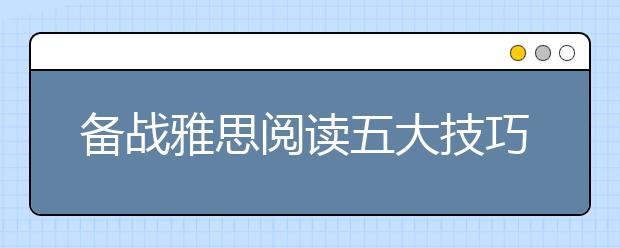 备战雅思阅读五大技巧
备战雅思阅读五大技巧
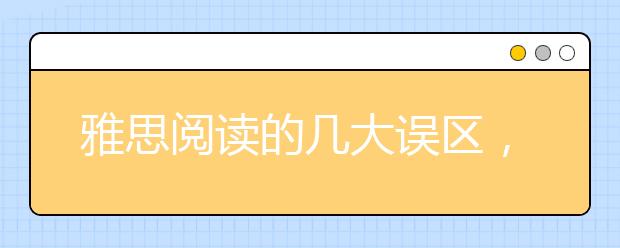 雅思阅读的几大误区,你占了几个?
雅思阅读的几大误区,你占了几个?
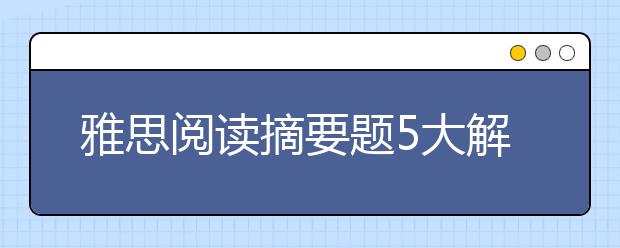 雅思阅读摘要题5大解题步骤讲解分析
雅思阅读摘要题5大解题步骤讲解分析
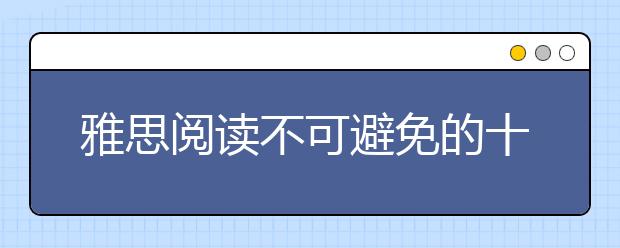 雅思阅读不可避免的十大坏习惯
雅思阅读不可避免的十大坏习惯
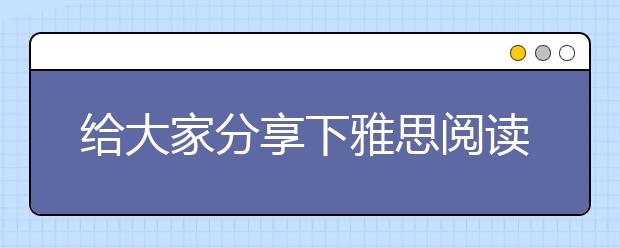 给大家分享下雅思阅读评分标准
给大家分享下雅思阅读评分标准
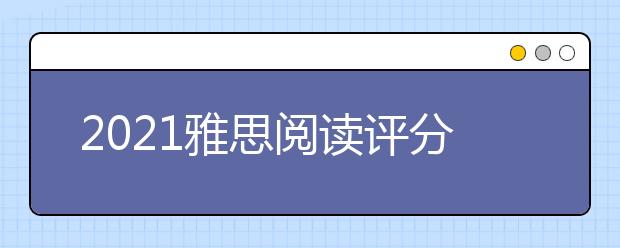 2021雅思阅读评分标准
2021雅思阅读评分标准
